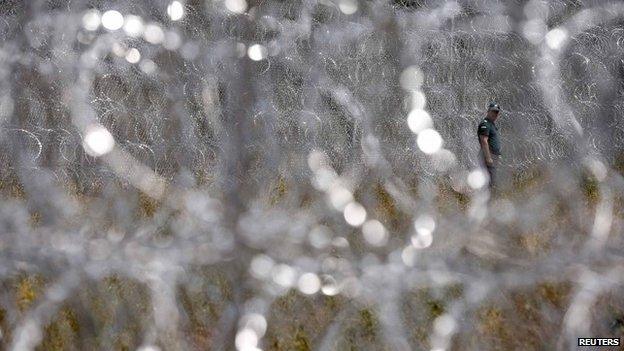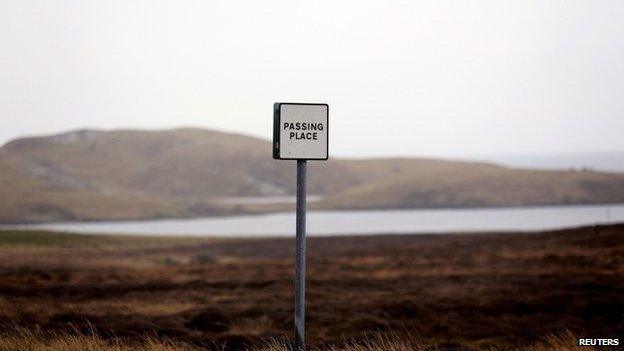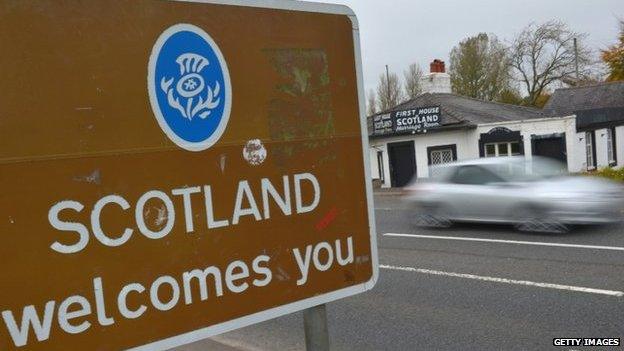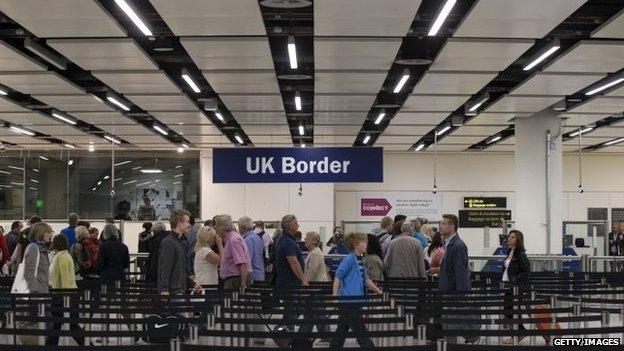Daily question: Would the Scottish border change post-Yes?
- Published
As the people of Scotland weigh up how to vote in the independence referendum, they are asking questions on a range of topics.
In this series, we are looking at those major questions and by using statistics, analysis and expert views shining a light on some of the possible answers.
Here, we focus on what the border between Scotland and England would look like in the event of a "Yes" vote.
Do you have a referendum question? Let us know by....
Emailing newsonlinescotland@bbc.co.uk.
We can also be found on Twitter @bbcscotlandnews, external
And on Facebook, external.
BBC website users - including Elinor Adamson, Jane Poulter, Victor Ivanov, David Owen, Hector Macduff, Stephen Egan, Angela Reilly, Peter Carrington and Alasdair McDonald - submitted questions about borders, immigration and citizenship.

Would there be border controls between an independent Scotland and England?

The prospect of controls at the border between Scotland and England is one of the more contentious issues raised by the pro-Union side.
In reality, it's virtually unthinkable that we'd see the appearance of guard towers and lines of curly barbed wire, but backers of a "No" vote claim there are border concerns which go beyond the simple fact of Scotland becoming a country in its own right.
And while some high-profile pro-Union politicians have strongly hinted some kind of check would be put in place, the Scottish government is 100% firm on its position - that free movement between Scotland and the rest of the UK [and Ireland] would continue in exactly the same way as it does right now.

What is the argument for having border checks anyway?

The prospect of border checks between an independent Scotland and England was raised by UK Home Secretary Theresa May back in 2012.
Her concern was that Scotland becoming part of the European Schengen common travel area could lead to immigration problems, with the rest of the UK having to take action to defend its interests as a result.
The Schengen Agreement, external (named after the Luxembourg town where it was signed) enabled passport-free movement between 25 European countries, but not the UK and Ireland.
However, the deal has been blamed for encouraging illegal migration and, at the time, the home secretary said there "could very well be some sort of border check," if Scotland became independent, but its form would depend on the issues related to the new country and Schengen.
More recently, Labour leader Ed Miliband said that if he was in power, his government "would have to look at the issue of a border" if the Scottish government achieved its goal of a looser immigration policy.
And the MP for Berwick-upon-Tweed, Sir Alan Beith, has also weighed in, arguing that he expects there to be border controls in his constituency if Scotland votes for independence.
The Liberal Democrat claimed his seat, which is on the border with Scotland, could become a place of "currency exchange kiosks and smugglers".

What does the Scottish government say about that?

SNP ministers say that, while their opponents have been busy "scaremongering" about possible border controls, they're crystal clear on the issue - that an independent Scotland would see the continuation of free movement with the rest of the UK and Ireland.
The Scottish government's position, as laid out in its White Paper prospectus for independence, external, categorically states: "There are no circumstances in which the Scottish government would countenance any measure being taken that jeopardized the ability of citizens across the rest of the UK and Ireland to move freely across our borders, as they are presently able to do so."
It says this would be achieved by remaining part of the Common Travel Area, which dates back to the 1920s.
And when it comes to Schengen, the current Scottish government says it would "not seek membership" of the area, adding there are "no grounds to believe" the EU would challenge Scotland being part of the CTA, rather than joining Schengen.

Is there a political dimension to this argument?

You bet there is. Not long after the last European elections, where UKIP gained the most votes in the UK - and won its first seat in Scotland - Scottish First Minister Alex Salmond said immigration was being used as a "weapon" to stoke up fears about independence.
Mr Salmond, who has calculated Scotland would need an extra 2,000 immigrants a year to make pensions affordable, accused rival parties of pandering to the likes of UKIP, rather than standing up to an anti-immigration message.
Shadow Pensions Secretary and Scottish Labour MP Gregg McClymont has dismissed the figure as "misleading", saying the Union made pensions in Scotland more affordable.